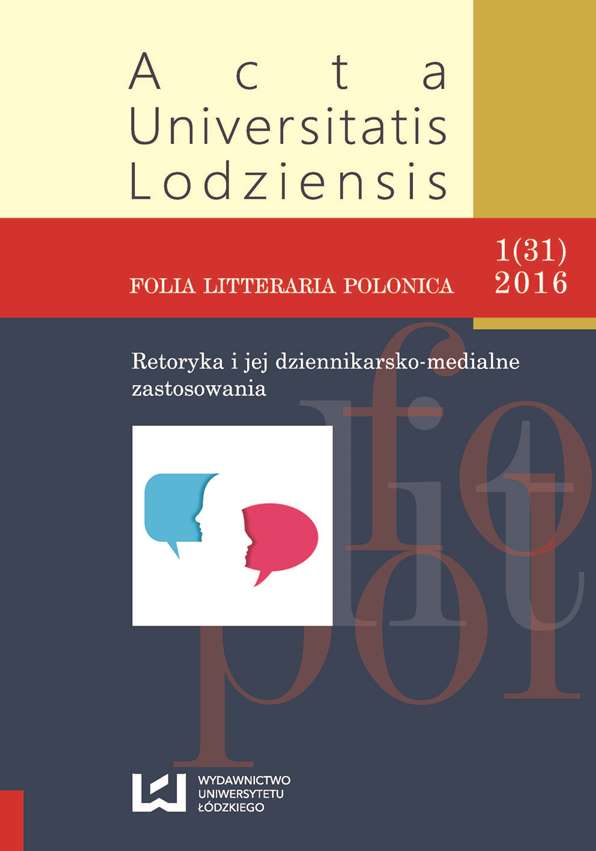Issues of Truth and Correctness vs. Rhetoric in Media Discourse
DOI:
https://doi.org/10.18778/1505-9057.31.01Keywords:
communication, concept of truth, mediaAbstract
Following Niklas Luhmann, the author assumes that communication creates social systems. The system therefore influences the nature of communication. The impact of rhetoric on media discourse can be understood as a result of the strategy adopted by the system. What follows from the above assumption is a discussion of the notion of truth which is fundamental to media philosophy. Systems, in their adopted strategies, affect the media and use persuasion in a way that is remote from the treatment of the truth as an idea or as a condition of an ethical nature.
Downloads
References
Austin J., Zur Theorie der Sprechakte (How to do things with words), 2. Auflage, Reclam, Stuttgart 1979.
Google Scholar
Awdiejew A., Konstruowanie trzeciej rzeczywistości, [w:] Mechanizmy perswazji i manipulacji. Zagadnienia ogólne, red. G. Habrajska, Oficyna Wydawnicza Lexem, Łask 2007, s. 95–104.
Google Scholar
Baudrillard J., Simulations, Columbia University, New York 1983, http://www.ee.sun.ac.za/~hgib-son/docs/html/Simulacra_and_Simulation.html#c2 [dostęp: 12.02.2015].
Google Scholar
Biuletyn nr 9, Kancelaria Sejmu, Biuro Komisji Sejmowych, Nr 3178/VI kad. 18.12.2009 r.
Google Scholar
Chłodna I., Retoryka klasyczna w kontekście warunków poprawności dyskursu filozoficznego, http://www.sapientiokracja.pl/index.php?option=com_content&view=article&id=95:retoryka-klasyczna-a-poprawnoc-dyskursu-filozoficznego&catid=38:imelda-chodna&Itemid=66 [dostęp: 16.11.2015].
Google Scholar
Gadamer H.-G., Prawda i metoda. Zarys hermeneutyki filozoficznej, przeł. B. Baran, Wydawnictwo Interesse, Kraków 1993.
Google Scholar
Heidegger M., Sein Und Zeit, Max Niemeyer Verlag, Tübingen 1986.
Google Scholar
K Le, Komisja hazardowa: raport i zdania odrębne, http://wiadomosci.onet.pl/kraj/komisja-hazardowa-raport-i-zdania-odrebne/4914q [dostęp: 15.02.2015].
Google Scholar
Lexikon für philosophische und theologische Ethik, Hrsg. P. van Tongeren, J.‑P. Wils, Schöningh Verlag, Paderborn 2004.
Google Scholar
Linke A., Nussbaumer M., Portmann P.R, Studienbuch Linguistik, 5.erweiterte Aufl., Max Niemeyer Verlag, Tübingen 2004.
Google Scholar
DOI: https://doi.org/10.1515/9783110914825
Luhmann N., Systemy społeczne. Zarys ogólnej teorii, przeł. M. Kaczmarczyk, wyd. 2 popr., Zakład Wydawniczy „Nomos”, Kraków 2012.
Google Scholar
Pałuszyńska E., Strategie dziennikarzy i ich rozmówców w medialnym dyskursie publicznym, Wydawnictwo UŁ, Łódź 2012.
Google Scholar
DOI: https://doi.org/10.18778/7525-749-6
Rytila T., What ‘Connecting People really means, http://lumiaconversations.microsoft.com/ [dostęp: 15.02.2015].
Google Scholar
Tugendhat E., Vorlesungen zur Einführung in die sprachanalytische Philosophie, Suhrkamp, Frankfurt am Main 1976.
Google Scholar
Downloads
Published
How to Cite
Issue
Section
License

This work is licensed under a Creative Commons Attribution-NonCommercial-NoDerivatives 4.0 International License.











